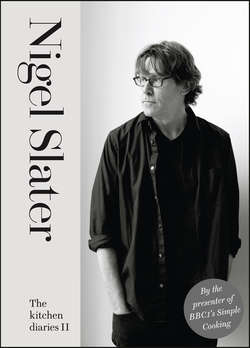Читать книгу The Kitchen Diaries II - Nigel Slater - Страница 31
JANUARY 15 A slow-cooked bean hotpot. And a quick version
ОглавлениеA dry day, warm enough to garden without a jacket. The earth, dark and moist from the week’s rain, crumbles in textbook fashion under the garden fork. There is still a scattering of bronze leaves and here and there the odd medlar that melts in your hand, leaving behind the ghost of wine dregs in a glass. Anyone with a scrap of land will value January days like these for getting the earth turned, roses pruned and stray leaves collected.
I spend a couple of hours tugging out the last of the borlotti beans, their dried stems still twisted around the hazel poles. This should have been done in December and both the bean stems and precious hazel supports snap like icicles. The odd purple-skinned potato and (useless) radish come to the surface as I fork the soil. Before I go in, I move a patch of soggy brown leaves from under the medlar tree and find three rhubarb tips poking teasingly through the soil. Their carmine rudeness against the chocolate-brown soil at first startles, then delights.
Technology excites me (be it Japanese Shinkansen trains or the next thing that Apple throws our way) but so does the celebration of slow, time-honoured rituals. The way of living that hasn’t changed in centuries. Houses built or restored using traditional methods, treading grapes to make wine (yes, a tiny number of vineyards still do it) and anything hand made. Last night I soaked beans for a hotpot. I could have opened a can of course, and sometimes I do, but the idea of doing something just as it has been done for thousands of years appeals to me. So I soak them, a mixture of small white haricot and black-eyed beans. You can soak different varieties of bean together if they are the sort that enjoy the same cooking time (long, oval flageolet take less than the rounder beans). Covering the beans with an equal volume of water is usually enough. But they should be drained and rinsed the following day. This will effectively reduce the oligosaccharides, those complex, indigestible sugars that make us fart. More importantly, it cuts down the cooking time.
